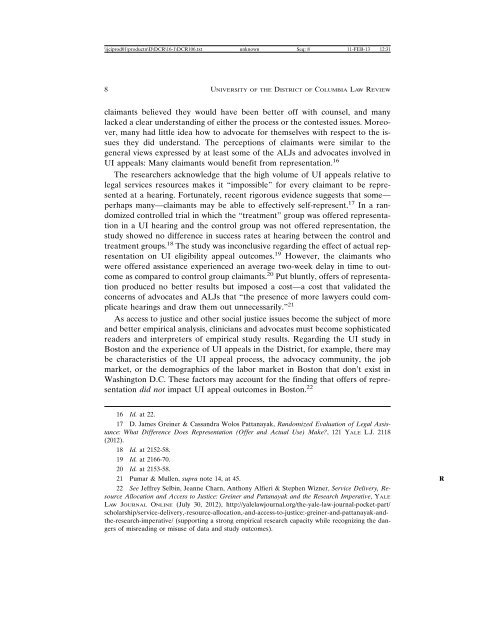volume 16, number 1 - UDC Law Review
volume 16, number 1 - UDC Law Review
volume 16, number 1 - UDC Law Review
- No tags were found...
Create successful ePaper yourself
Turn your PDF publications into a flip-book with our unique Google optimized e-Paper software.
\\jciprod01\productn\D\DCR\<strong>16</strong>-1\DCR106.txt unknown Seq: 8 11-FEB-13 12:318 UNIVERSITY OF THE DISTRICT OF COLUMBIA LAW REVIEWclaimants believed they would have been better off with counsel, and manylacked a clear understanding of either the process or the contested issues. Moreover,many had little idea how to advocate for themselves with respect to the issuesthey did understand. The perceptions of claimants were similar to thegeneral views expressed by at least some of the ALJs and advocates involved inUI appeals: Many claimants would benefit from representation. <strong>16</strong>The researchers acknowledge that the high <strong>volume</strong> of UI appeals relative tolegal services resources makes it “impossible” for every claimant to be representedat a hearing. Fortunately, recent rigorous evidence suggests that some—perhaps many—claimants may be able to effectively self-represent. 17 In a randomizedcontrolled trial in which the “treatment” group was offered representationin a UI hearing and the control group was not offered representation, thestudy showed no difference in success rates at hearing between the control andtreatment groups. 18 The study was inconclusive regarding the effect of actual representationon UI eligibility appeal outcomes. 19 However, the claimants whowere offered assistance experienced an average two-week delay in time to outcomeas compared to control group claimants. 20 Put bluntly, offers of representationproduced no better results but imposed a cost—a cost that validated theconcerns of advocates and ALJs that “the presence of more lawyers could complicatehearings and draw them out unnecessarily.” 21As access to justice and other social justice issues become the subject of moreand better empirical analysis, clinicians and advocates must become sophisticatedreaders and interpreters of empirical study results. Regarding the UI study inBoston and the experience of UI appeals in the District, for example, there maybe characteristics of the UI appeal process, the advocacy community, the jobmarket, or the demographics of the labor market in Boston that don’t exist inWashington D.C. These factors may account for the finding that offers of representationdid not impact UI appeal outcomes in Boston. 22<strong>16</strong> Id. at 22.17 D. James Greiner & Cassandra Wolos Pattanayak, Randomized Evaluation of Legal Assistance:What Difference Does Representation (Offer and Actual Use) Make?, 121 YALE L.J. 2118(2012).18 Id. at 2152-58.19 Id. at 2<strong>16</strong>6-70.20 Id. at 2153-58.21 Pumar & Mullen, supra note 14, at 45. R22 See Jeffrey Selbin, Jeanne Charn, Anthony Alfieri & Stephen Wizner, Service Delivery, ResourceAllocation and Access to Justice: Greiner and Pattanayak and the Research Imperative, YALELAW JOURNAL ONLINE (July 30, 2012), http://yalelawjournal.org/the-yale-law-journal-pocket-part/scholarship/service-delivery,-resource-allocation,-and-access-to-justice:-greiner-and-pattanayak-andthe-research-imperative/(supporting a strong empirical research capacity while recognizing the dangersof misreading or misuse of data and study outcomes).














